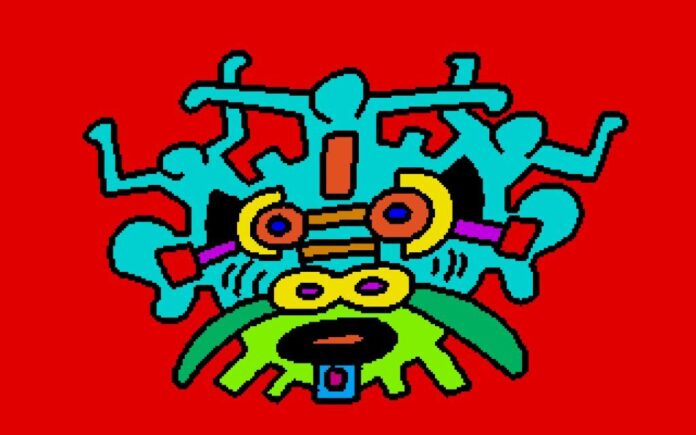In 1986, Keith Haring was offered an Amiga personal computer by Timothy Leary. The psychedelic pioneer-turned-software developer was then devising a video game adaptation of William Gibson’s 1984 novel Neuromancer, and had invited Haring to create visuals for the game using the Commodore-made machine. “This is the hot graphics computer that Andy [Warhol] helped publicize last year,” he told Haring, referring to the Pop artist’s attendance at the 1985 Amiga press conference.
At this point, Haring had overcome his initial ambivalence toward technology (“We are threatened,” he journaled in 1978, “by this coming machine aesthetic”) as he became increasingly acquainted with digital tools in the 1980s. He was one of the few artists to experiment with Quantel Paintbox, a Photoshop forerunner, and most famously received, along with Warhol and Kenny Scharf, a computer tutorial from Steve Jobs on nine-year-old Sean Lennon’s Apple Macintosh in 1984.
While Leary’s project would eventually fall through, Haring would nonetheless use the Amiga to create drawings in his vibrant visual language. In fluorescent hues, the digital works feature his figurative motifs, drawn with his trademark bold lines and squiggles that convey a spirited kineticism, however pixelated. Long stored on floppy disks in Leary’s papers, the drawings had never seen the light of day—until now.

Keith Haring, (1987). Photo: © Keith Haring Foundation, courtesy of Christie’s.
From September 12–20, Christie’s will host “Keith Haring: Pixel Pioneer,” an online auction of five NFTs of the artist’s Amiga drawings, which have been minted on the Ethereum blockchain. The sale is organized in collaboration with licensing agency Artestar and the Keith Haring Studio, a subsidiary of the Keith Haring Foundation.
“The Amiga drawings are significant because they were created at the dawn of the consumer computer age,” Gil Vazquez, executive director and president of Keith Haring Foundation, told Artnet News. “Even then, Keith knew that computers were going to be important to people’s lives as their capabilities continued to advance.”
Haring’s drive to master the digital medium ran alongside the street artist’s conviction that art should transcend the walls of galleries, Vazquez said. “What we know about Keith’s approach to digital tools is his belief that they, too, could be used to communicate ideas. Art being expressed digitally via computers—the Amiga, in this case—was in Keith’s mind an inevitability,” he added.

Keith Haring, (1987). Photo: © Keith Haring Foundation, courtesy of Christie’s.
Each of the NFTs in “Pixel Pioneer” is estimated at $200,000 to $500,000, with the entire collection valued at $1.65 million. They’re conservative estimates, coming on the heels of Christie’s 2021 NFT auction of Amiga drawings created by Andy Warhol, which collectively raked in $3.3 million.
“We looked at the traditional Keith Haring market for both prints and paintings, but also where we are in terms of the digital market today and how the Warhol ones did in 2021,” said Nicole Sales Giles, vice president and director of digital art sales at Christie’s. “They’re estimated more conservatively to start, and we hope that it’s a good price point to attract bidders.”

Keith Haring, (1987). Photo: © Keith Haring Foundation, courtesy of Christie’s.
The collection is arriving amid a dicey NFT market, but one which has nonetheless seen wins recently for debut drops headlined by Jackson Pollock and Yue Minjun. Haring’s launch in Web3 could gain traction among a collecting community whose ostensible ethos aligns with that of the artist, or that’s the hope.
“Keith was such a proponent of bringing art to everyone,” Sales Gilles said. “I think if Keith were alive today, he would be a huge supporter of the Web3 community, which is trying to merge the cultures of traditional and online art collecting.”
“We feel that the time for the proliferation of art in the digital realm has come,” Vazquez said. “Creating works of art in unconventional mediums was something Keith was known for. The technology has finally caught up to the vision. This is an important moment.”
“Keith Haring: Pixel Pioneer” is on view at Christie’s Seoul, 2F, 5 Palpan-gil, Jongro-gu,
Seoul, South Korea, September 7–8, 2023; and Christie’s New York, 20 Rockefeller Plaza, New York, New York, September 14–19, 2023.

























